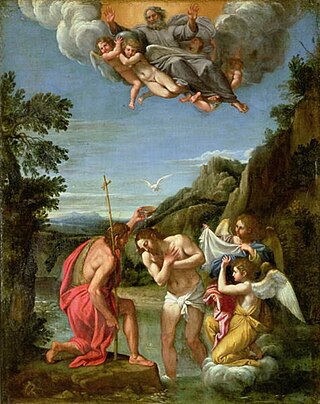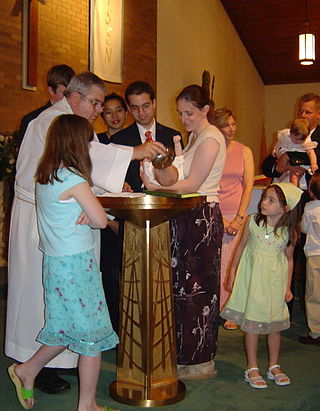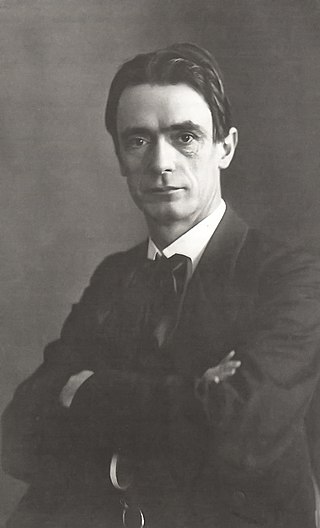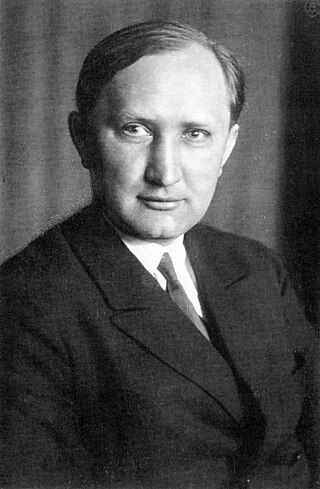Anthroposophy is a spiritual new religious movement which was founded in the early 20th century by the esotericist Rudolf Steiner that postulates the existence of an objective, intellectually comprehensible spiritual world, accessible to human experience. Followers of anthroposophy aim to engage in spiritual discovery through a mode of thought independent of sensory experience. Though proponents claim to present their ideas in a manner that is verifiable by rational discourse and say that they seek precision and clarity comparable to that obtained by scientists investigating the physical world, many of these ideas have been termed pseudoscientific by experts in epistemology and debunkers of pseudoscience.

Adoptionism, also called dynamic monarchianism, is an early Christian nontrinitarian theological doctrine, subsequently revived in various forms, which holds that Jesus was adopted as the Son of God at his baptism, his resurrection, or his ascension. How common adoptionist views were among early Christians is debated, but it appears to have been most popular in the first, second, and third centuries. Some scholars see adoptionism as the belief of the earliest followers of Jesus, based on the epistles of Paul and other early literature. However, adoptionist views sharply declined in prominence in the fourth and fifth centuries, as Church leaders condemned it as a heresy.

Baptism is a Christian sacrament of initiation almost invariably with the use of water. It may be performed by sprinkling or pouring water on the head, or by immersing in water either partially or completely, traditionally three times, once for each person of the Trinity. The synoptic gospels recount that John the Baptist baptised Jesus. Baptism is considered a sacrament in most churches, and as an ordinance in others. Baptism according to the Trinitarian formula, which is done in most mainstream Christian denominations, is seen as being a basis for Christian ecumenism, the concept of unity amongst Christians. Baptism is also called christening, although some reserve the word "christening" for the baptism of infants. In certain Christian denominations, such as the Catholic Churches, Eastern Orthodox Churches, Oriental Orthodox Churches, Assyrian Church of the East, and Lutheran Churches, baptism is the door to church membership, with candidates taking baptismal vows. It has also given its name to the Baptist churches and denominations.

In Christianity, Christology is a branch of theology that concerns Jesus. Different denominations have different opinions on questions such as whether Jesus was human, divine, or both, and as a messiah what his role would be in the freeing of the Jewish people from foreign rulers or in the prophesied Kingdom of God, and in the salvation from what would otherwise be the consequences of sin.

Infant baptism is the practice of baptizing infants or young children. Infant baptism is also called christening by some faith traditions.

Rudolf Joseph Lorenz Steiner was an Austrian occultist, social reformer, architect, esotericist, and claimed clairvoyant. Steiner gained initial recognition at the end of the nineteenth century as a literary critic and published works including The Philosophy of Freedom. At the beginning of the twentieth century he founded an esoteric spiritual movement, anthroposophy, with roots in German idealist philosophy and theosophy. His teachings are influenced by Christian Gnosticism. Many of his ideas are pseudoscientific. He was also prone to pseudohistory.

In Christian denominations that practice infant baptism, confirmation is seen as the sealing of the covenant created in baptism. Those being confirmed are known as confirmands. For adults, it is an affirmation of belief. The ceremony typically involves laying on of hands.
The following outline is provided as an overview of and topical guide to Christian theology:
Liberal Christianity, also known as liberal theology and historically as Christian Modernism, is a movement that interprets Christian teaching by taking into consideration modern knowledge, science and ethics. It emphasizes the importance of reason and experience over doctrinal authority. Liberal Christians view their theology as an alternative to both atheistic rationalism and theologies based on traditional interpretations of external authority, such as the Bible or sacred tradition.

Esoteric Christianity is a mystical approach to Christianity which features "secret traditions" that require an initiation to learn or understand. The term esoteric was coined in the 17th century and derives from the Greek ἐσωτερικός.
Sergei Olegovich Prokofieff was a Russian anthroposophist. He was the grandson of the composer Sergei Prokofiev and his first wife Lina Prokofiev, and the son of Oleg Prokofiev and his first wife Sofia Korovina. Born in Moscow, he studied fine arts and painting at the Moscow School of Art. He encountered anthroposophy in his youth, and soon made the decision to devote his life to it.
In keeping with its prevailing self-identity as a via media or "middle path" of Western Christianity, Anglican sacramental theology expresses elements in keeping with its status as a church in the catholic tradition and a church of the Reformation. With respect to sacramental theology the Catholic tradition is perhaps most strongly asserted in the importance Anglicanism places on the sacraments as a means of grace, sanctification and forgiveness as expressed in the church's liturgy.
Catholic theology is the understanding of Catholic doctrine or teachings, and results from the studies of theologians. It is based on canonical scripture, and sacred tradition, as interpreted authoritatively by the magisterium of the Catholic Church. This article serves as an introduction to various topics in Catholic theology, with links to where fuller coverage is found.
Friedrich Rittelmeyer was a Lutheran German minister, theologian and the principal founder and first leader of The Christian Community. Rittelmeyer came to prominence in the early 20th century as a leading academic liberal theologian and priest in Germany and wrote several books that advocated a socially engaged "Christianity of deeds" (Tatchristentum). During the First World War he eventually became one of the most high-profile clergymen in Germany to publicly oppose the war. From the 1910s his thinking was gradually influenced by the philosopher Rudolf Steiner, and in 1922 a group of mainly Lutheran priests and theology students led by Rittelmeyer founded The Christian Community as an ecumenically oriented Christian community inspired by Steiner's writings; The Christian Community is primarily a liturgical community with only a loose creed, and for that reason rejects Christian dogmas. Rittelmeyer saw it as a continuation of the liberal Christian tradition of which he was the foremost representative in Germany in the early 20th century.

Emil Bock was a German anthroposophist, author, theologian and one of the founders of The Christian Community.

The pre-existence of Christ asserts the existence of Christ prior to his incarnation as Jesus. One of the relevant Bible passages is John 1:1–18 where, in the Trinitarian interpretation, Christ is identified with a pre-existent divine hypostasis called the Logos. There are nontrinitarian views that question the aspect of personal pre-existence, the aspect of divinity, or both.
Christian theology is the theology – the systematic study of the divine and religion – of Christianity and Christian belief and practice. It concentrates primarily upon the texts of the Old Testament and of the New Testament, as well as on Christian tradition. Christian theologians use biblical exegesis, rational analysis and argument. Theologians may undertake the study of Christian theology for a variety of reasons, such as in order to:
Spanish Adoptionism was a Christian theological position which was articulated in Umayyad and Christian-held regions of the Iberian peninsula in the 8th- and 9th centuries. The issue seems to have begun with the claim of archbishop Elipandus of Toledo that – in respect to his human nature – Jesus Christ was adoptive Son of God. Another leading advocate of this Christology was Felix of Urgel. In Spain, Adoptionism was opposed by Beatus of Liebana, and in the Carolingian territories, the Adoptionist position was condemned by Pope Hadrian I, Alcuin of York, Agobard, and officially in Carolingian territory by the Council of Frankfurt (794).
The following outline is provided as an overview of and topical guide to the Catholic Church:
Peter Selg is a German psychiatrist. He was born in Stuttgart and studied medicine in Witten-Herdecke, Zurich, and Berlin. Until 2000, he worked as the head physician of the juvenile psychiatry department of Herdecke hospital in Germany. Selg is director of the Ita Wegman Institute for Basic Research into Anthroposophy and professor of medicine at the Alanus University of Arts and Social Sciences (Germany). He lectures extensively and is the author of numerous books.











